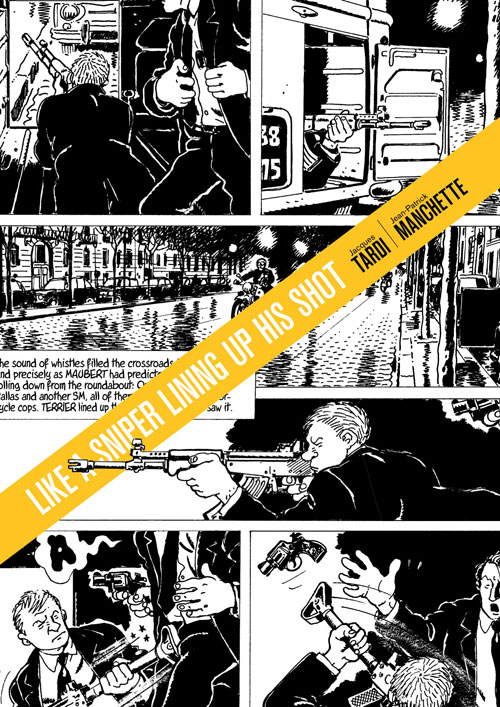Like a Sniper Lining Up His Shot
Jacques Tardi, writer/artist
Adapted from the novel by Jean-Patrick Manchette
Fantagraphics, 2011
104 pages, hardcover
$18.99
Buy it from Fantagraphics
Buy it from Amazon.com
Fantagraphics keeps churning out lovely translated editions of the work of French comics master Jacques Tardi at a truly admirable clip. This is the fourth in what I would consider the “main” Tardi/Fanta line of slim hardcovers, distinguished by no-nonsense Adam Grano cover designs that juxtapose key sequences from Tardi’s ink-soaked black-and-white interior art with bold slashes of color and block-caps for title and credit information. If there’s a better mesh of form and function in comics right now this side of, well, Fanta’s similarly designed Love and Rockets digests, I’d sure love to see it. In much the same vein as Tardi’s previously released adaptation of a crime novel by author Jean-Patrick Manchette, West Coast Blues, Like a Sniper Lining Up His Shot is a grimly economical story of a man on the run from killers, with bursts of violence that slash in out of nowhere. In other words, you can judge a book by its cover.
The two books have much in common beyond their common language of men hunted by hitmen across the length and breadth of France. Both protagonists are bizarrely taciturn about their predicaments, almost to the point where you’re left to wonder if there’s some sort of mental disability involved. Sniper‘s Martin Terrier (great name) at least has the excuse of being a mercenary and assassin to explain his flat affect where killing’s concerned, as opposed to West Coast Blues‘ wrong-man family-guy George. But he more than makes up for this in his personal life, a disaster area predicated entirely on his deeply weird belief that the women with whom he involves himself can switch their affections for him on and off after years of one setting or the other based solely on his say-so. The woman for whom he “risks it all” — Tardi and Manchette’s interpretation of this trope ladles those sneer quotes all over it — is an equally weird and unpleasant character, ricocheting from emotion to emotion when Terrier’s intrusion into the life she’d been leading without him violently upends her status quo, until finally settling on some weird sneering sex-hungry brand of derision for him and his life of crime and adventure.
In all honesty, these emotional and behavioral patterns are so difficult to recognize even when allowing for the remove between a hired gun and a comics critic that they get in the way of Tardi and Manchette’s underlying indictment of society’s casual savagery, and its propensity for covering up that savagery with bullshit that pins it on The Other Side. But upon reflection, I wonder if these terrible people’s wholly alien way of interacting with the world isn’t just the writing equivalent of Tardi’s nimble, scribbled line and sooty blacks — a heightened reality in which things are rendered at their loosest, darkest, ugliest, and weirdest at all times. God knows both creators can rigorously focus when they want: Manchette squeezes a quite believable custody battle between Terrier and his now-ex girlfriend over a beloved cat into the proceedings, while Tardi’s backgrounds and lighting effects are a realist’s dream and his action sequences and set-pieces are choreographed tighter than a drum. The absurdist demeanors may prevent everything from gelling as well as they might have done, but overall the book delivers a fastball to your face so hard that you barely have time to notice that some of the stitches need straightening.
Tags: comics, comics reviews, Comics Time, Fantagraphics, Jacques Tardi, jean-patrick manchette, Like a Sniper Lining Up His Shot, reviews


Great review, Sean. I haven’t gone back to compare, but my sense was that Like a Sniper was much more text-heavy than West Coast Blues — that the text seemed more intrusive and generally seemed to be carrying more of the weight of the plot. Did this register with you? I was wondering if that difference in the works is the result of particular qualities in the Manchette novels being adapted.